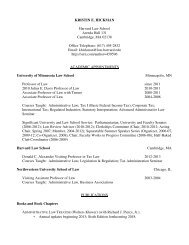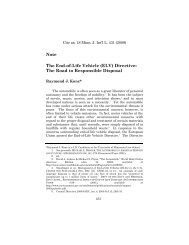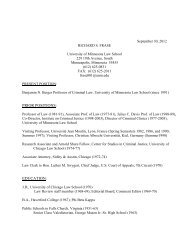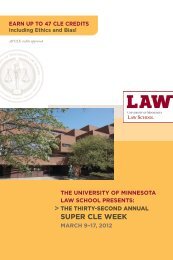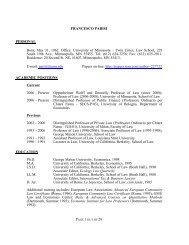Enabling Private Ordering - the University of Minnesota Law School
Enabling Private Ordering - the University of Minnesota Law School
Enabling Private Ordering - the University of Minnesota Law School
Create successful ePaper yourself
Turn your PDF publications into a flip-book with our unique Google optimized e-Paper software.
2009] UMBRELLA CLAUSES 21<br />
to shield <strong>the</strong> State against interferences by o<strong>the</strong>r States and to<br />
justify internally <strong>the</strong> State’s power to impose binding decisions<br />
and, if necessary, enforce <strong>the</strong>m. When understood broadly as <strong>the</strong><br />
State’s ultimate power, sovereignty clashes with <strong>the</strong> necessity<br />
for <strong>the</strong> host State to make credible and enforceable<br />
commitments so as to enter into binding agreements vis-à-vis<br />
foreign investors. It constitutes an impediment to efficient<br />
investor-State cooperation, instead <strong>of</strong> empowering States in<br />
<strong>the</strong>ir relationship with foreign investors. As will be argued in<br />
this section, effective third-party dispute settlement and<br />
enforcement mechanisms for host State promises are <strong>of</strong>ten<br />
lacking, both on <strong>the</strong> domestic level and under <strong>the</strong> traditional<br />
customary international law framework. As will be shown, <strong>the</strong><br />
latter is particularly incapable <strong>of</strong> stabilizing investor-State<br />
contracts both substantively and procedurally. Finally, this<br />
section argues that <strong>the</strong>se shortcomings can only be alleviated<br />
imperfectly in <strong>the</strong> absence <strong>of</strong> efficient enforcement mechanisms<br />
based on contractual arrangements between investors and host<br />
States.<br />
1. Enforcement <strong>of</strong> Host State Promises in Domestic Courts<br />
The courts <strong>of</strong> <strong>the</strong> host State will <strong>of</strong>ten not be well positioned<br />
to enforce <strong>the</strong> State’s promises as <strong>the</strong>y relate to foreign<br />
investors. Existing or perceived bias against foreign investors,<br />
or even <strong>the</strong> lack <strong>of</strong> an independent and efficient judiciary, may<br />
diminish <strong>the</strong> ability <strong>of</strong> <strong>the</strong> courts <strong>of</strong> <strong>the</strong> host State to serve as<br />
efficient and effective institutions to enforce host State promises<br />
and counter opportunistic host State behavior. Judicial<br />
independence is particularly compromised by close institutional<br />
ties between courts and <strong>the</strong> executive, and missing safeguards<br />
against political influence on court proceedings. Fur<strong>the</strong>rmore,<br />
particularly in many developing countries, <strong>the</strong> low income <strong>of</strong><br />
judges and <strong>the</strong> insufficient financial support <strong>of</strong> courts <strong>of</strong>ten not<br />
only aid and abet corruption, 43 but also result in lengthy and<br />
ineffective dispute resolution. Such factors may compromise <strong>the</strong><br />
ability <strong>of</strong> <strong>the</strong> host State’s domestic courts to function as<br />
independent and efficient dispute resolvers that effectively back<br />
43. On corruption in <strong>the</strong> judiciary, see Eduardo Buscaglia & Maria Dakolias,<br />
An Analysis <strong>of</strong> <strong>the</strong> Causes <strong>of</strong> Corruption in <strong>the</strong> Judiciary, 30 LAW & POL’Y INT’L BUS.<br />
95 (1999); Maria Dakolias & Kimberley Thachuk, The Problem <strong>of</strong> Eradicating<br />
Corruption from <strong>the</strong> Judiciary: Attacking Corruption in <strong>the</strong> Judiciary: A Critical<br />
Process in Judicial Reform, 18 WIS. INT’L L.J. 353 (2000).




